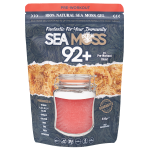ACEROLA CHERRY

Acerola cherry is an ingredient in our Pre-workout blend, below you will find fascinating information and key benefits about this ingredient.
Acerola cherry originates in the West Indies and resembles a cherry. It is extremely high in Vitamin C, which is vital to optimum immune system function and healthy collagen production. Anthocyanins can boost brain function and reduce inflammation which pectin aids digestion.
Originating in Mexico and the Caribbean, acerola cherry is also known as ‘Barbados cherry’ and ‘West Indies cherry’. Although it resembles a cherry, it isn’t a cherry but a berry. However, it does have a very delicious, sweet taste and a history of being used in traditional medicine.
Acerola cherry is very high in Vitamin C and has no problem providing our recommended daily intake of it. Due to this, it’s typically used to treat colds, flu and as a strong antioxidant. It’s also extremely beneficial for the immune system, which requires Vitamin C to function properly.
Acerola cherry also contains anthocyanins, which are linked to improved brain function and memory. As a potent antioxidant, acerola cherry can soothe inflammation which is thought to cause diseases such as Alzheimer’s and Parkinson’s.
It is also very rich in a resistant fibre called pectin, which acts as a strong prebiotic. Together with high levels of malic acid also present in acerola cherry, it is also very effective for aiding healthy digestion.
Vitamin C plays an important role in the body’s production of collagen, which is essential to maintaining healthy skin, hair and nails. Therefore, the extremely high levels of the vitamin in acerola cherry make it very good at treating skin conditions and as an astringent, it also promotes skin elasticity.
It also contains good levels of Vitamin A, iron, magnesium, potassium and zinc, so it’s certainly a fantastic all-round, powerful little berry!
Acerola cherry is safe for most people to use but it can interact with medications such as warfarin, fluphenazine and drugs containing oestrogen.
Key benefits of acerola cherry include:
- Anti-inflammatory Effects: Acerola cherry contains polyphenolic compounds with anti-inflammatory properties. These compounds can help reduce inflammation in the body, which is associated with various chronic conditions like heart disease, arthritis, and certain types of cancer.
- Cardiovascular Health: The presence of minerals like potassium and magnesium in acerola cherry can help promote cardiovascular health. Potassium is important for maintaining normal blood pressure, while magnesium contributes to heart rhythm regulation and blood vessel relaxation. The boosted collagen production also helps keep blood vessels healthy, thus supporting the whole cardiovascular system.
- Enhanced Immune Function: The high vitamin C content in acerola cherry supports immune system function. It helps stimulate the production of white blood cells, enhances the activity of immune cells, and strengthens the body's defence against infections, illnesses and malignant cells.
- Nutritional Support and Energy: Acerola cherry provides a range of essential vitamins and minerals, including vitamin A, B vitamins, and various minerals. These nutrients play vital roles in energy metabolism, cellular function, and overall well-being. Vitamin C is also known to be a stimulant, thus giving the consumer an energy boost.
- Skin Health and Anti-ageing Effects: The combination of vitamin C, vitamin E, carotenoids, iron, calcium, zinc and other antioxidants in acerola cherry can benefit skin health. These nutrients help combat oxidative stress, reduce skin damage caused by UV radiation, support collagen synthesis, and promote overall skin radiance. They can also help minimise the appearance of wrinkles and fine lines and give the skin a healthy glow.
- Stable Blood Sugar Levels: The fibre content in acerola cherry can slow down the absorption of glucose into the bloodstream. This can help prevent spikes in blood sugar levels after meals. Additionally, the anthocyanins present in acerola cherry have been shown to decrease blood sugar levels, improve insulin resistance and overall insulin function.
There are certain medications that may interact with acerola cherries or affect their effectiveness. Here are some medications to be cautious of when consuming acerola cherries:
- Antacids Containing Aluminium or Magnesium: Acerola cherries, being a source of vitamin C, can increase the absorption of aluminium and magnesium from antacids. This may not be suitable if you are taking antacids that contain these minerals. The increased absorption of aluminium can be of concern in individuals with kidney dysfunction.
- Iron Supplements: Vitamin C from acerola cherries can enhance the absorption of non-heme iron (iron from plant-based sources) from supplements or plant-based foods. This can be beneficial for individuals with iron-deficiency anemia but may lead to increased iron absorption if you are taking iron supplements in excess.
- Anticoagulants (Blood Thinners): High doses of vitamin C, as found in supplements or concentrated sources like acerola cherries, can potentially interfere with the blood-thinning effects of certain anticoagulant medications. It's advisable to monitor your vitamin C intake if you are taking blood-thinning medications like warfarin (Coumadin) and discuss any significant dietary changes with your healthcare provider.
- Medications Affected by Stomach Acidity: Acerola cherries, as a source of vitamin C, can influence stomach acidity. Some medications, such as certain antibiotics and antifungal drugs, may have their absorption or effectiveness affected by changes in stomach acidity. If you are taking such medications, it's advisable to maintain consistent dietary habits, including acerola cherry consumption, and follow your healthcare provider's guidance.
- Aspirin and NSAIDs: Acerola cherries, as a natural source of salicylates, may contain compounds similar to aspirin. If you are sensitive to salicylates or taking aspirin or non-steroidal anti-inflammatory drugs (NSAIDs), monitor your response to acerola cherries and discuss any adverse effects with your healthcare provider.
- Medications for Acid Reflux (Proton Pump Inhibitors): Acerola cherries may influence stomach acidity, which can affect the absorption of medications like proton pump inhibitors (PPIs) used to treat acid reflux. It's advisable to follow your healthcare provider's recommendations regarding PPI use and dietary considerations.
Acerola cherry is a fruit known for its high vitamin C content and potential health benefits. However, like any food, it may not be suitable for individuals with specific allergens or medical conditions. Here are some considerations:
- Gout: Acerola cherries, like some other fruits, contain natural sugars and can be relatively high in vitamin C. Some individuals with gout may need to limit their intake of high-purine foods, which can contribute to elevated uric acid levels. While acerola cherries are not particularly high in purines, it's advisable for individuals with gout to monitor their consumption of all fruits and assess their individual tolerance.
- Kidney Stones: Acerola cherries contain oxalates, which can contribute to the formation of kidney stones in susceptible individuals. If you have a history of kidney stones, it's advisable to moderate your intake of high-oxalate foods, including acerola cherries.
- Lactation: Acerola cherries are generally safe for breastfeeding women when consumed in moderation as part of a balanced diet. They can provide vitamin C and other nutrients. However, any dietary changes during lactation should be discussed with a healthcare provider to ensure they align with the specific needs of both the mother and the infant.
- Gastroesophageal Reflux Disease (GERD): The acidity of acerola cherries may exacerbate symptoms of GERD in some individuals. If you have GERD or experience acid reflux, it's recommended to limit or avoid highly acidic foods like acerola cherries.
- Medication Interactions: If you are taking specific medications or supplements, consuming acerola cherries or other high-vitamin C foods can potentially interact with the absorption or effectiveness of these medications. For example, vitamin C can enhance the absorption of iron from plant-based sources (non-heme iron), which may be beneficial or problematic depending on your specific health condition or medication regimen. It's advisable to consult with a healthcare provider or pharmacist if you have concerns about potential interactions.
- Diabetes: Acerola cherries, like many fruits, contain natural sugars. If you have diabetes or are managing your blood sugar levels, it's essential to monitor your carbohydrate intake, including fruit consumption.
Recommended Products
DIVE DEEPER
Raw Acerola Cherry 100g
Vitamins present |
Value |
Minerals present |
Value |
|---|---|---|---|
|
Vitamin A |
38µg - 4% |
Calcium |
12mg - 1% |
|
Vitamin B2/Riboflavin |
0.06mg - 5% |
Iron |
0.2mg - 3% |
|
Vitamin B5/Pantothenic acid |
0.309mg - 6% |
Phosphorus |
11mg |
|
Vitamin C |
1680mg - 1867% |
Selenium |
0.6µg - 1% |



